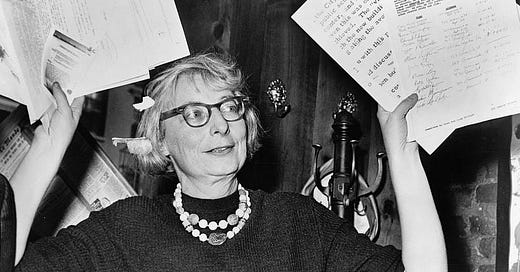Planners keep their friends close and Jane Jacobs closer
...which is why you should know a little something about her opinions about urbanism.
Jane Jacobs was a writer and activist who is best known for her book The Death and Life of Great American Cities (1961) and for her “just a housewife” underdog battles against powerful government agencies and corporations in New York City.
I can’t recommend that book enough. Buy it or borrow it, but read it.
Compassionate, bracingly indignant, and always keenly detailed, Jane Jacobs's monumental work provides an essential framework for assessing the vitality of all cities. —Goodreads
The planning profession claims to adore and respect her as a thinker, a provocateur, and a bold advocate for the underdog. And yet, she observed that the planning profession was detached from the realities of life. She wouldn’t let planners hear the end of it.
The pseudoscience of planning seems almost neurotic in its determination to imitate empiric failure and ignore empiric success.
—Jane Jacobs, 1961
Jacobs argued that cities were complex and organic systems that could not be controlled from the top down. She advocated for giving more power to local residents, property owners, and business owners. Basically the opposite of what city planners are trained and expected to do.
The American Planning Association honors Jacobs in a bunch of ways. They’ve named awards, lectures, and events after her, even though the industry continues to create the outcomes she hotly opposed. I find this endlessly fascinating and I realize I’m not alone. Here’s Strong Towns founder Chuck Marohn:
Why do I tell you this? Because I want you to get a glimpse of the wonderfully subversive Jane Jacobs.
If you’re running into obstacles when talking with professional planners, it might help to reference someone they idolize. With that in mind, here are a dozen quotes from the legend.
Planners have a habit of assuming that they know what is good for people better than the people themselves do.
The planning profession has been arrogant and wrongheaded in its approach to cities.
Planning theory is sometimes the most insidious enemy of planning practice because it can blind practitioners to the consequences of what they do.
Planning should be about enabling people to shape their own cities, not about imposing someone else's vision on them.
Long blocks kill street life.
Cities need to be planned with people in mind, not cars.
Cities are not problems to be solved, but organisms to be understood.
The need for diversity is one of the most important things to understand about cities.
Slums are not caused by the poor. They are caused by planners who do not understand the city.
Cities need a diversity of uses, not a uniformity of uses.
Cities need a mix of old and new buildings, not a tabula rasa.
Zoning laws do not replace development, they merely prevent it.






Need to get quote #6 tattooed on my arm.
Brilliant